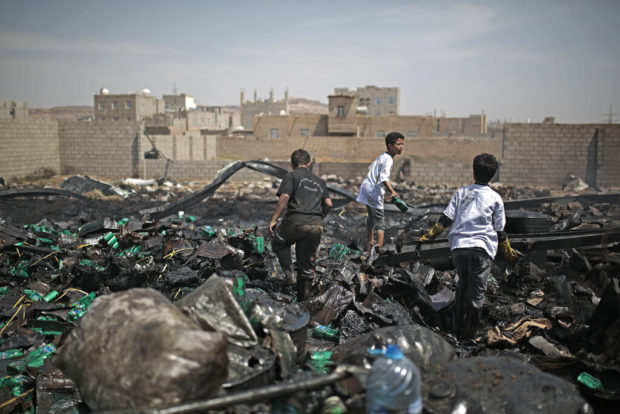Saudi-led coalition launches new strikes on Yemeni capital

Workers salvage oil canisters from the wreckage of a vehicle oil store hit by Saudi-led airstrikes in Sanaa, Yemen, Thursday, July 2, 2020. (AP Photo/Hani Mohammed)
CAIRO — The Saudi-led coalition fighting Iran-backed rebels in Yemen said Thursday that it unleashed a new air campaign on the war-torn country’s capital and on other provinces, in retaliation for drone attacks on Saudi Arabia that were claimed by the rebels.
“The targeting of civilians and civilian facilities is a red line,” said Col. Turki al-Maliki, a spokesman for the coalition.
He was quoted by Yemen’s official SABA news agency, and was referring to the alleged missile and drone strikes on Saudi cities last week that the rebels, known as Houthis, had claimed.
“The Houthi leaders will not be tolerated and will be held accountable,” he added.
Residents in Sanaa, Yemen’s rebel-held capital, reported hearing huge explosions as a round of bombs fell on the city on Wednesday night. The explosions lasted into Thursday. Houthi-run media claimed several civilian casualties but their reports could not be independently verified. Bombs struck an oil storage depot, setting off a series of thunderous blasts, according to Ahmed Al-Sharif, a local official.
Article continues after this advertisementOn Thursday, children and workers were cleaning up and trying to salvage remaining oil from the wreckage of the warehouse. The site was still smoking as they raked through the rubble, their bare hands and feet stained black by crude oil.
Article continues after this advertisement“Two airstrikes hit us, bombing our residential neighborhood,” said Sanaa resident Kamel Al-Saffani.
While coalition warplanes routinely bomb rebel targets across the country, airstrikes inside the capital are rare. Several residents said the scale of bombing on Wednesday night brought back memories of when the U.S.-backed Arab coalition first launched its air campaign in 2015, aiming to drive out the Houthis who had overrun the capital and much of the country’s north.
Al-Maliki said the coalition’s military operation targeted the Houthis’ “specific military capabilities” at an airbase and airport in Sanaa, as well as the northern province of Saada, from which it alleges the Houthis had launched attacks on the kingdom. He said the coalition sought to avoid harming civilians while blaming the Houthis for embedding military installations within residential areas.
Last week, Saudi air defences intercepted a ballistic missile fired “toward Riyadh,” its capital, according to the coalition spokesman, and destroyed two other ballistic missiles and eight bomb-carrying drones launched by the rebels.
The coalition’s declaration of a military operation signaled a possible escalation in the conflict, even as U.N. envoy Martin Griffiths met in Riyadh with Saudi and Yemeni government officials in an effort to restart cease-fire talks between the warring sides.
Griffiths discussed a proposed joint cease-fire declaration with a government delegation Thursday, according to a government statement, which would commit the parties to economic and humanitarian measures and the resumption of the hamstrung political process. The Houthis have not commented publicly on the U.N.’s current push for a cease-fire.
Earlier this spring, the Saudi-led coalition announced a unilateral cease-fire in Yemen, citing the coronavirus pandemic. Although swiftly dismissed by the Houthis, the gesture signaled the kingdom was seeking to wind down its involvement in the costly war, which has killed over 112,000 people and set off what the U.N. has labeled the world’s worst humanitarian disaster.